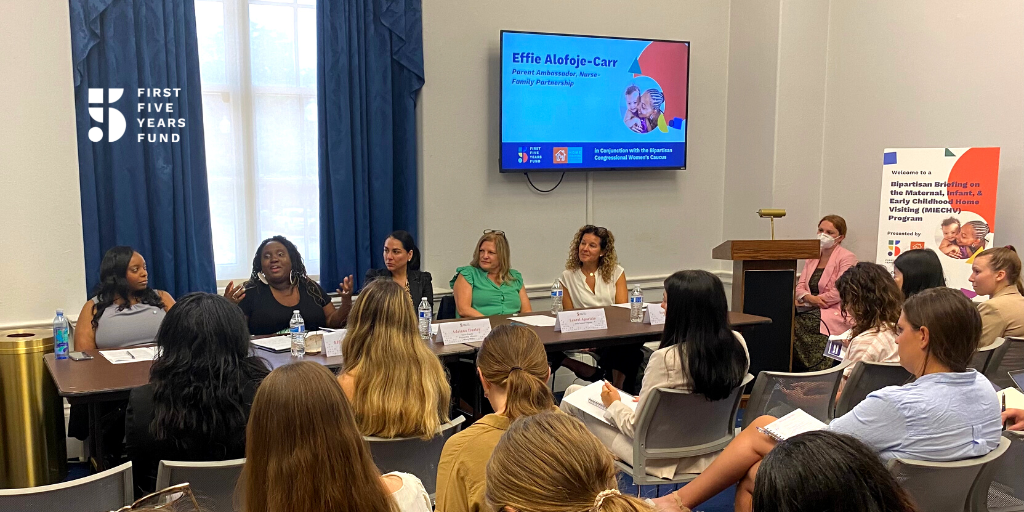FFYF Co-Hosts Bipartisan Congressional Briefing on MIECHV Reauthorization

First Five Years Fund (FFYF) and the National Home Visiting Coalition, in conjunction with the bipartisan Congressional Women’s Caucus, held a briefing on Capitol Hill to highlight the need to reauthorize & strengthen the Maternal, Infant, and Early Childhood Home Visiting (MIECHV) program for congressional staff. A panel of program administrators, home visitors, and parents shared their experience and expertise on the federally-funded voluntary home visiting program, which serves over 140,000 parents and children across the country. MIECHV is set to expire on September 30, 2022, and FFYF, along with the National Home Visiting Coalition, is asking Congress to promptly reauthorize the program in order to prevent any lapse in service for families across the country who receive MIECHV-funded services.
Moderated by FFYF’s Executive Director, Sarah Rittling, panelists shared their expertise and insight on the impact of this program and the families they serve with congressional staff in attendance.
Briefing panelists included:
- Laurel Aparicio: Director, Early Impact Virginia & MIECHV Administrator
- Adriana P. Hurley, RN, BSN, MPH: Nurse Manager of Maternal and Child Health Programs, Nurse-Family Partnership Alliance Miami-Dade
- Effie Alofoje-Carr: Nurse-Family Partnership Parent Ambassador
- Natalie Towns: Federal Policy Specialist, Healthy Families America
Ms. Rittling opened the briefing by setting the stage for the conversation, sharing the impact of the program on families and emphasizing the bipartisan nature of the program. She noted that “funding for programs like MIECHV that support America’s earliest learners and littlest children have proved to be a unifying priority for both Democratic and Republican leaders.” The broad bipartisan support for MIECHV was on display in a March 2022 hearing held by the House Ways & Means Subcommittee on Worker and Family Support, in which Subcommittee members enthusiastically praised the program as being the gold standard of evidence-based policymaking. Ms. Rittling shared some of the positive outcomes that MIECHV-funded home visiting has shown for families, including reduced maternal mortality and morbidity, improved infant and child health, improved school readiness, and improved family well-being and stability.
Ms. Aparicio provided a state-level perspective, sharing her insight as a statewide administrator of the program for Virginia. She underscored some of the challenges that the field has faced in the last two years due to the COVID-19 pandemic, sharing that “home visiting providers pivoted immediately at the start of the pandemic and developed new, innovative ways to maintain connection with families – from virtual home visiting to porch drop-offs of supplies and activities. Home visitors were no less than heroic in their efforts.” She later discussed some of the persistent challenges facing the field due to MIECHV being flat funded for nearly a decade, noting that “MIECHV providers are making tough decisions about whether to increase wages to recruit and retain home visitors or reduce the number of families served.”
Ms. Hurley described her journey in becoming a nurse home visitor, beginning first as an expectant mother herself who received support from a childbirth educator which ignited her desire to provide the same support to other families in her community. As a nurse home visitor with MIECHV-approved home visiting model Nurse-Family Partnership (NFP), Ms. Hurley supports families in a variety of areas including personal health, environmental health, and life courses. She shared, “the most rewarding part of the job is to be able to see how pregnancy outcomes and child development markers were improved as well as how many families were able to achieve economic sufficiency. It was amazing to experience how the program was able to improve healthy brain development and school readiness in children, prevent child abuse and neglect, strengthen, and empower families and break the cycle of poverty.”
To provide the perspective of a parent who has benefited from MIECHV services, Ms. Alofoje-Carr gave context as to what sorts of personal challenges she faced in both the pre- and postnatal stage of parenthood, and how her home visitor supported her through these challenges. She talked about her experience with maternal depression, anxiety, and job loss. Upon seeing a poster promoting home visiting support, she signed up to receive services through NFP. She shared that her home visitor was able to provide breastfeeding support, connect her to a therapist to help her through her maternal depression and anxiety, and eventually was able to find employment with NFP to become a coordinator for the home visiting program in her community.
Finally, Ms. Towns offered insights from a different MIECHV-approved home visiting model, Healthy Families America (HFA). She highlighted demographic information about their program, noting that HFA serves 70,000 families in 38 states, the District of Columbia, and five U.S. territories. She underscored that HFA home visitors are highly trained professionals who prioritize relationships with their families, sharing “the first job of staff is to build a strong connection with the families being served. From there, HFA home visitors and parents collaborate to set meaningful and attainable goals.” She emphasized the significance of providing flexibility to families and putting communities in the driver’s seat to “identify existing service gaps and the best mechanism to get support to families, ensuring [home visitors] bring community knowledge and lived expertise to the work.”
As the MIECHV program is set to expire in the fall, the National Home Visiting Coalition has 3 primary asks of lawmakers as they work toward reauthorization: scale up MIECHV funding over the next 5 years with increases of $200 million annually arriving at a total of $1.4 billion; double the Tribal set-aside from 3% to 6%; and continue to allow virtual home visiting with model fidelity as an allowable service delivery option for families. To learn more about the MIECHV program and the National Home Visiting Coalition’s reauthorization asks, view FFYF’s MIECHV FAQ here.
To see state-by-state data and information about MIECHV, use this list.
Subscribe to FFYF First Look
Every morning, FFYF reports on the latest child care & early learning news from across the country. Subscribe and take 5 minutes to know what's happening in early childhood education.



